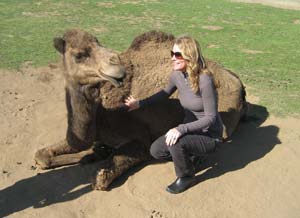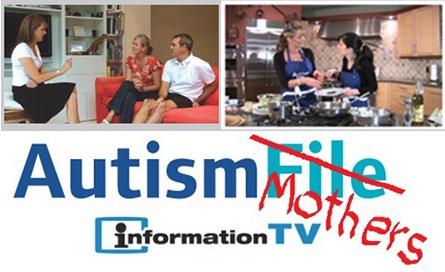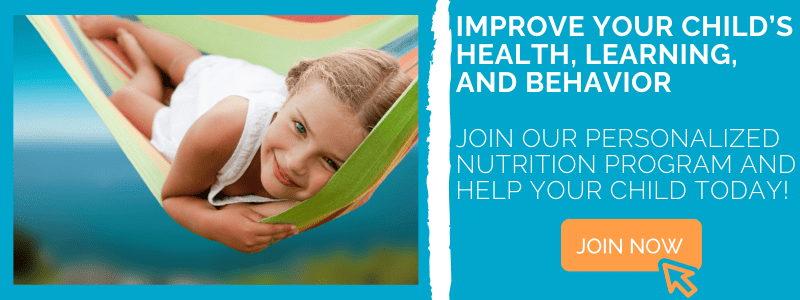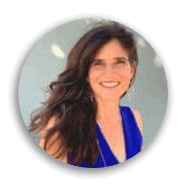 Interview with Author, Christina Adams
Interview with Author, Christina Adams
I love synchronicity.
I’ve been writing for the
Autism File Magazine for a few years now. In a recent telephone conversation with the Editor, Rita Shreffler, we were tossing around ideas for articles and I mentioned “camel milk.” Rita said that Christina Adams
just finished an amazing article on camel milk that would be out in the next issue! What a surprise! Camel milk is not that widely known, and I was so excited that Christina, one of the first people (possibly THE first) person to ever import it for medical reasons, had written an article! I was eager to speak with her right away! I had recently written an article on camel milk for my blog, so I wanted to talk with the expert herself! So I called her.
After chatting, we decided that conducting an interview (and posting the audio recording) would be a fun way to share this information with busy moms! (
did you know I’ve done radio for the past nine years?)
It’s 72 minutes of fun, intrigue, and hope! Here are a few highlights:
- Christina is the first person in the US to get camel milk imported for autism
- Her first shipment gets dumped on the tarmac
- She befriends someone at FDA (something I don’t think I could do!)
- Christina shares the wonderful healing support camel milk offers her son
- Christina announces breaking news on camel milk’s use for a serious disease currently untreatable

Remember to pick up a copy of the
Autism File Magazine, April/May issue, on stands now, or
subscribe and have it delivered to your door! This issue has many wonderful articles. Today I was talking with a colleague, Karen Hubert, who is the subject of my article this month on yeast overgrowth – and we both agreed – there are SO MANY good articles in this issue. A few of my favorites:
- Got [Camel] Milk?: Anecdotal evidence suggests it may improve autism symptoms, but getting it from the desert to your door isn’t easy, by Christina Adams
- The Folate Factor, A newly discovered disorder may play a role in autism, by Dan Rossignol
- Juggling Act: A full adult life means many things if your child has autism, by Kim Stagliano
- Can I say mine? 🙂 Yeast, Your Child, and You: Given its ability to affect multiple systems in our bodies, and cause many varied symptoms, yeast overgrowth can create a serious health crisis, by Julie Matthews
Here is the audio recording of the interview
[audio:https://nourishinghope.com/audio/JulieMatthewsInterviewsChristinaAdams_CamelMilk.mp3]
DOWNLOAD the Mp3
HERE
TRANSCRIPT below – Here is the beginning on our interview…
Julie: I’m Julie Matthews. I’m a certified nutrition consultant for Nourishing Hope and we have Christina Adams today. I am so thrilled to have her – she is the author of “A Real Boy,” she has a Masters in Fine Arts and Creative Writing, and she has an amazing book. A Real Boy: A True Story of Autism, Early Intervention and Recovery, is from Berkeley Books and Penguin Press. It’s a successful memoir available on Kindle. After a career at the Pentagon and in aerospace, she turned her attention to autism when her son was diagnosed at age 2. She lectures nationally and consults with international scientists in health and camel milk. Her credits include National Public Radio, The Washington Post, Child Magazine, The Los Angeles Times, The Los Angeles Times Magazine, Orange County Register, Autism File Global Magazine and literary magazines. She consults for small pharmaceutical information firms and is a parent advocate. Welcome Christina!
Christina: Well, thank you, Julie.
Julie: I’m really excited to have you here today because camel milk is such an interesting topic. Just in the last six months, it has exploded and you have been doing this for so long. I can’t wait to get your larger historical reference and information about what’s going on. But just in my time, I only found out about camel milk about a year ago at a conference. A mom came up to me and said, “Hey, you need to check out camel milk.”
“Oh, no, camel milk is milk – it’s all casein, it’s all wrong, I can’t do it!” She nicely said, “Well, it’s very different, you should research it.” For me, what happens is if I hear something more than once, then something in the universe tells me I need to look into this further. A number of months went by and I didn’t do anything and I got an invitation to join two moms on their camel milk group on Facebook. So I decided okay, great, that means something. I actually met the original mom and she told me about it. She’s also in this group. I learned all sorts of things – I started researching it, looking into it, hearing what these moms were saying about it, and thought it was unbelievably amazing. I did my own research, I read a bunch of scientific studies, and I wrote an article on it on my blog, and at that time–I certainly don’t take credit for all this—there were a bunch of people in my group that had asked me about it, for my posting as well as it kind of took off in this group that started doubling in size. And before you know it there wasn’t enough camel milk to go around, so that’s a new challenge we were having. But I want to hear that it holds some great promise. Parents had been seeing some great results, so I am really excited to have you, who’s such an expert and long-time user sharing your knowledge and what you’ve learned about it.
Let’s see – maybe we should start with the beginning – and your story. Maybe you can share some about the story with your son and how you first got introduced into the subject.
Christina: Thank you, I would love to – and what you said about the universe kind of bringing something your way, it’s as if to put yourself in certain circumstances and sometimes these amazing things happen.
In 2005, right around that time when I had my book coming out, I happened to be at a children’s book fair in Orange County, California, where I live, and I saw a camel standing at a pen. I thought, “No one’s riding that camel, so why is a camel in a children’s book fair if no one was riding it?” So sort of being a nosy-type writer person, I went over. That’s when I found out that there was camel milk, and they were making soaps and lotions out of it. But not settling for that answer, I asked the person, “What else do they do with this milk?” And he says it’s used in hospitals in the Middle East for premature babies, it’s supposed to be non-allergenic. That was enough to trip off this line of inquiry in my mind. I just had this really strong feeling that this would be an excellent product for both children and adults that perhaps had allergies and other issues, because my own son having problems with so many foods and being in the autism spectrum, that I have been living with forever – no good dairy substitute. So I went home that day, started looking up camel milk on Pub Med. But there was hardly any information. There were very few, little bits of reports here and there, mostly from hospitals and there was no mention of autism. Maybe allergies or trying to make cheese, that kind of obscure thing. So I printed them out and right after that, that’s when I became separated from my husband and life became a bit more challenging and different. However, I never let go of the camel milk instinct that I had.
Then I started researching it more, in that winter of ’05, and then I just kind of had a strong feeling, still thinking this could be really important to him in some way. Eventually, I didn’t know about this, but I found that article written by Dr. Reuven Yagil that had talked about his use of the milk on a child with autism and how he got a good response, and it was an ‘05 paper but I don’t think I’d seen it until early ’06. So I thought after that, I knew this could potentially benefit my son and now this is kind of proof to me that, wow, somebody out there had the same instinct. They did something and tried it out.
Now I got obsessed with getting the milk, naturally. I had a friend who was from Pakistan and he was going to Israel and so he brought some milk back for me. But it was dumped at the dock at JFK because I didn’t know how to properly get it in the country at that time. There were a lot of strict rules for products from international destinations, of course, because of potential disease issues and things like that. I just kind of kept researching it and finding out everything I could. Then in early ‘07 I actually taught a little class in a university to a business group to try to see how you would treat this product – how you would treat it to keep this business up and running? I was well aware at that time I had a lot of barriers – camels are hard to get, they’re not the easiest to milk, and there were some other regulatory issues that make it quite difficult.
I was still kind of focusing on that, then I remembered, “Hey, isn’t there a camel place somewhere in California?” It turned out, the man I had met–the one that told me about the camel milk on the children’s fair–was Gil Riegler, who with his wife Nancy runs OASIS camel dairy in the nearby San Diego California area. So I called them up and convinced them for me to come down and talk about the milk. It turns out that I had already been in touch with some scientists in Israel who are wonderful people, and when I talked to Gil about that, turns out his brother lived next door to one of the people I had been already talking to in Israel. The camel world is a small, tight network and I had made great connections there and I learned more about camels.
But then to back up in ’06, I had begun these conversations with scientists, because I had called up Dr. Reuven Yagil. And he very kindly, even though I called him very late at night, led me to Eyal Lipshitz, who is a wonderful man who owns a camel dairy in Israel. So I made contact also with someone who advises him, Dr. Amnon Gonenne, a very eminent biomedical scientist in Israel and America as well. We developed a wonderful mentoring network where he (Dr. Gonenne) mostly mentored me about camel milk and also I shared some information with him about autism. Together we had some wonderful conversations, kind of illuminating connections between camel milk and autism, and the difference in the way they interact. After I talked to everybody, I was able to get some milk from Eyal from Israel and put it on ice.
I got the milk late ’06 or early ’07 but didn’t give it until the middle of ’07 because I was going through a very horrible divorce situation, with my ex-husband, who happens to be an attorney. Throughout this dark time, the camel milk had been quite an inspiration to kind of keep me going, and focus on something larger than those problems. Now, in ’mid-07 when I finally met a wonderful man who is my husband now, and a great stepfather, he said, “Why don’t we give your son this camel milk that’s in the freezer?” And I said, “It’s about time, isn’t it?” And so in ‘07 my son had been developing some problems. He was only nine at the time. He had always been doing great, but he would develop these behavior breakdowns where if he didn’t eat about two hours, two and a half hours, suddenly his behavior would just deteriorate and we had to kind of shove food into him to kind of stabilize him. I had never seen that before and it was really frightening to me, as there are diabetes on both sides of his family. I was concerned there was some sort of issue surrounding that. So when we gave the camel milk, it was one night at bed, half a cup with cereal. And the next morning we woke up and we had a changed boy. He was having–although he’d always had good language since all of his intervention worked really well–he was being emotional and loving even more, he was having great complex conversations and introspection, pragmatics were even better. At the breakfast table that morning, it was amazing; he was calmer, more aware, focused, with self-direction. At the time, his behavior had become so bad because of whatever was going on biologically, that he couldn’t even pay attention and cross the street anymore, so within a couple of weeks of the milk, he was crossing the street and being in parking lots totally fine by himself again. It was just really one of those things you just can’t believe it until you see it.
Julie: So after that I’m assuming you, thought ok, there’s obviously something big to this, and at that point, was ready to hunt camel’s milk. Since it’s not so easy to get, probably I’m guessing you thought, ok this is good, let’s keep going and then you had to figure out how you’re going to get milk.
Christina: That is [true]. But since I had already gotten some and I met some people that had known how to get it into the country, I kind of took a little bit of inspiration. My thought was, I’m going to get a doctor’s letter that is going to justify getting this into the country. Which I, of course, did get the first time [I brought it in]. I thought, I really need to formalize this. I got a doctor’s letter that was a little more complicated and explained the benefits of camel’s milk, and what it’s for. And then we were able to equip the person that was going to bring it to me from Israel with the letter. We had to pay part of the ticket or a whole ticket, depending on who was bringing it in. The amount varied as well, which was pretty much, so if you wanted to get two whole suitcases in, which is the maximum a person could bring if they didn’t bring much of their own luggage, then that was a lot of bottles. Basically suitcases filled with frozen liter bottles. So it was very risky. Because you would get the doctors letter and buy the person’s ticket, which from Israel from the US would be $1400US.
Then you would have to pay for the milk, which I would get it from Eyal at the Milk From Eden camel dairy from Israel. They would pack it that morning, send it to the airport. You’d hope there weren’t any problems. You’d hope the plane didn’t get delayed and the milk would stay frozen, all nestled next to each other down in the belly of the plane. Then you’d pick it up and hope whoever was coming with it would get it through US Customs okay with that letter. And then you’d finally wait and they’d roll off the airplane and there were your precious suitcases.
Julie: I bet your relief was indescribable after all that. Now did you ever have any problems when you had this whole system down? Did you ever have problems after that?
Christina: I’m very fortunate we have never had any problems and I have a wonderful person with the USDA in Los Angeles who told me—I told him what
I was doing, he was very sympathetic—and he said, “Well you need to make sure that this is going to continue to work for you. So he advised that I get in touch with the Washington headquarters of the USDA, which I did. And that’s when I had to explain the whole thing to this very kind woman. A very serious, official woman, but a very kind woman, who, when I explained the whole thing, sent the letters and all the kinds of paperwork they needed. She authorized a shipment and I was very grateful. But then she only authorized a certain amount of bottles. Know that I was going to pay the ticket price of the whole thing anyway, I kind of asked her to reconsider—and to authorize the full load. And she actually did.
[That’s the end of the transcript…]
Here is the audio recording of the full interview
[audio:https://nourishinghope.com/audio/JulieMatthewsInterviewsChristinaAdams_CamelMilk.mp3]
DOWNLOAD the Mp3
HERE
 Interview with Author, Christina Adams
Interview with Author, Christina Adams Remember to pick up a copy of the Autism File Magazine, April/May issue, on stands now, or subscribe and have it delivered to your door! This issue has many wonderful articles. Today I was talking with a colleague, Karen Hubert, who is the subject of my article this month on yeast overgrowth – and we both agreed – there are SO MANY good articles in this issue. A few of my favorites:
Remember to pick up a copy of the Autism File Magazine, April/May issue, on stands now, or subscribe and have it delivered to your door! This issue has many wonderful articles. Today I was talking with a colleague, Karen Hubert, who is the subject of my article this month on yeast overgrowth – and we both agreed – there are SO MANY good articles in this issue. A few of my favorites:




I found powdered camel milk online. Would that be just as good?
Most of the camels in Arizona were part of the original camels brought to the US for the US army camel corps. If they do not know about the camel farmers group, they should! Good understanding of the background here! Thanks for a great interview.
Julie, why don’t you consider doing a full interview with Reuven Yagil, since he is not available on the Healing With Camel Milk board, but rather through camelmilkmagic.com
Wow! What an incredible story. I am curious as to the taste of it.
I can not believe the results were that quick.
Here in Arizona there is a ranch with a couple of camels.. I am almost tempted to go ring their doorbell and enquire if they are selling the camel’s milk.
I would!
Well worth listening to! Thank you for this interview Julie and Christina!